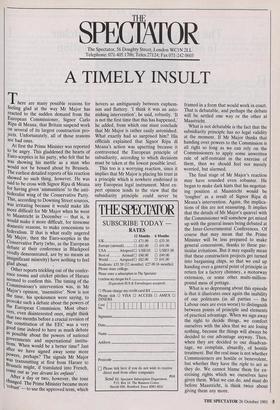SPECTATOR
The Spectator, 56 Doughty Street, London WC1N 2LL Telephone: 071-405 1706; Telex 27124; Fax 071-242 0603
A TIMELY INSULT
There are many possible reasons for feeling glad at the way Mr Major has reacted to the sudden demand from the European Commissioner, Signor Carlo Ripa di Meana, that Britain suspend work on several of its largest construction pro- jects. Unfortunately, all of those reasons are bad ones.
At first the Prime Minister was reported to be angry. This gladdened the hearts of Euro-sceptics in his party, who felt that he was showing his mettle as a man who would not be bossed about by Brussels. The earliest detailed reports of his reaction showed no such thing, however. He was said to be cross with Signor Ripa di Meana for having given 'ammunition' to the anti- federalist wing of the Conservative Party. This, according to Downing Street sources, was irritating because it would make life more difficult for Mr Major when he went to Maastricht in December — that is, it would make it more difficult, for tiresome domestic reasons, to make concessions to federalism. If that is what really angered Mr Major, then the Euro-sceptics in the Conservative Party (who, as the European debate at their conference in Blackpool vividly demonstrated, are by no means an insignificant minority) have nothing to feel glad about. , Other reports trickling out of the confer- ence rooms and cricket pitches of Harare seemed to confirm this. The timing of the Commissioner's intervention was, in Mr Major's opinion, 'insensitive'. Now is not the time, his spokesmen were saying, to provoke such a debate about the powers of the European Commission. Most obser- vers, even disinterested ones, might think that two months before a crucial revision of the constitution of the EEC was a very good time indeed to have as much debate as possible about the powers of national governments and supernational institu- tions. When would be a better time? Just after we have signed away some more Powers, perhaps? The signals Mr Major was transmitting at first from Harare to Brussels might, if translated into French, Come out as 'pas devant les enfants'. After a day or two, however, the tone c, hanged. The Prime Minister became more robust' — to use the approved term, which hovers so ambiguously between euphem- ism and flattery. 'I think it was an asto- nishing intervention', he said, robustly. 'It is not the first time that this has happened,' he added, from which one must conclude that Mr Major is rather easily astonished. What exactly had so surprised him? His officials explained that Signor Ripa di Meana's action was upsetting because it contravened the European principle of subsidiarity, according to which decisions must be taken at the lowest possible level.
This too is a worrying reaction, since it implies that Mr Major is placing his trust in a principle which is nowhere enshrined in any European legal instrument. Most ex- pert opinion tends to the view that the subsidiarity principle could never be framed in a form that would work in court. That is debatable, and perhaps the debate will be settled one way or the other at Maastricht.
What is not debatable is the fact that the subsidiarity principle has no legal validity at the moment. If Mr Major thinks that handing over powers to the Commission is all right so long as we can rely on the Commissioners to apply some unwritten rule of self-restraint in the exercise of them, then we should feel not merely worried, but alarmed.
The final stage of Mr Major's reaction may have sounded even robuster. He began to make dark hints that his negotiat- ing position at Maastricht would be `tougher' as a result of Signor Ripa di Meana's intervention. Again, the implica- tions of this are not reassuring. It implies that the details of Mr Major's quarrel with the Commissioner will somehow get mixed up with the general issues being debated at the Inter-Governmental Conferences. Of course that may mean that the Prime Minister will be less prepared to make general concessions, thanks to these par- ticular irritations. But it may equally mean that these construction projects get turned into bargaining chips, so that we end up handing over a general point of principle in return for a factory chimney, a motorway extension, or some other multi-million- pound mess of pottage.
What is so depressing about this episode is that it illustrates once again the inability of our politicans (in all parties — the Labour ones are even worse) to distinguish between points of principle and elements of practical advantage. When we sign away the right to decide things, we comfort ourselves with the idea that we are losing nothing, because the things will always be decided to our advantage anyway. Then, when they are decided to our disadvan- tage, we complain, absurdly, of hostile treatment. But the real issue is not whether Commissioners are hostile or benevolent, but whether they have the right to act as they do. We cannot blame them for ex- ercising rights which we ourselves have given them. What we can do, and must do before Maastricht, is think twice about giving them any more.








































 Previous page
Previous page